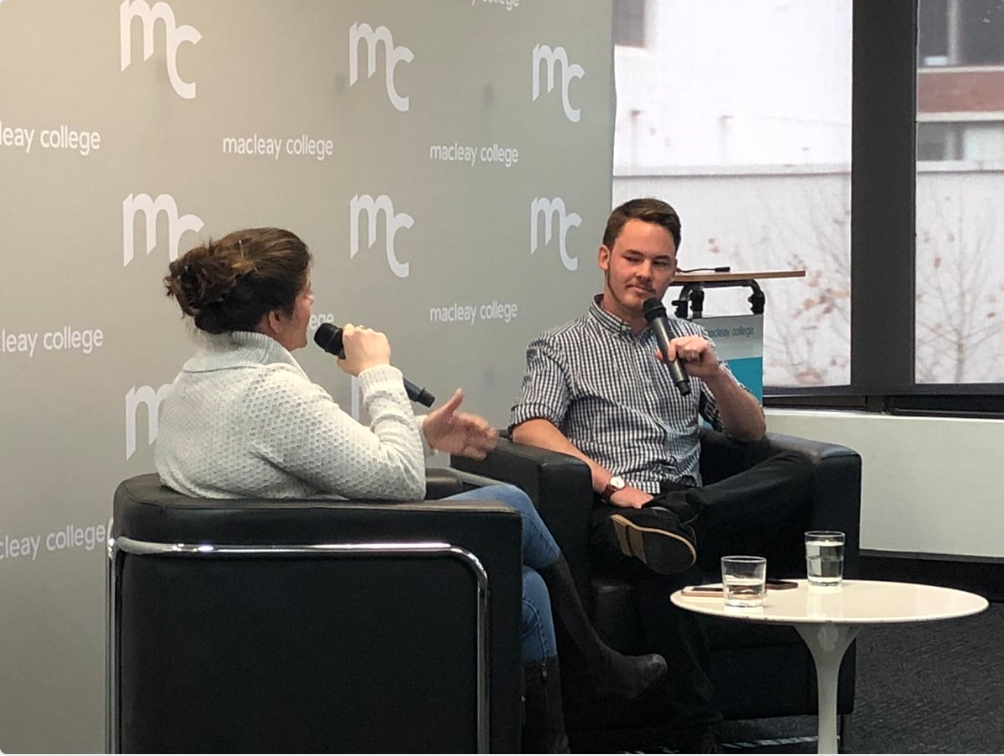Hatch continues its six-part series of Macleay alumni success stories with Storyful video producer, Lachlan Brunton.
During his last trimester at Macleay, Lachlan Brunton started the balancing act of joining Macleay’s Newsroom video production team and interning at both NSW Rugby and the Daily Telegraph.
He graduated in 2015 and left with the experience of coordinating social media, writing on American sports for an Australian audience and pushing out a video in under a day. It was this experience that made him the first video producer for Storyful. An Australian news agency, verifying, authenticating and producing video content for other media organizations like The Daily Telegraph, The New York Times, News.com and the Washington Times.

What is Storyful and what kind of service do you provide in the news industry?
“Storyful is basically a social media news agency. We’re owned by Newscorp. I’ll just talk about the media side of Storyful because we have three main parts to the company including brands and risk and reputation.
(On) the media side, basically our job is to verify content for our news partners. We are sort of…other news agencies’ right-hand man. They basically look at stories and come to us [saying], “Hey guys, what do you think of this? Can you tell us where this video is from? Is this video real?” and questions like that.
Our main partners in Australia are other Newscorp people, The Daily Telegraph, Courier Mail, News.com. We’ve got five offices internationally. We’ve got an office in Dublin, in New York, in London, Hong Kong, and Sydney. In New York, our partners include The New York Times, The Washington Times, places like that.
(Storyful) has kind of a video database called the “News Wire”, where our journalists go through social media and find videos of news stories every day. Their job is to either clear those videos, where they go to the uploader and say “Hey mate, my name is so and so I’m from Storyful are we able to use your video with credit saying, this is your video, this is where we got it.”
How important is Storyful for digital journalism?
“I think what we do is incredibly important… When we verify something and we say “this is this and this is where it’s from”, they trust us to just go “yeah ok cool. Done putting that in”. The people we get videos from trust us when we say “We’re only going to give you this little amount of money now for the video, but in six months you’re going to receive a cheque from all the other views and you’re going to get more money.” I think that’s something that’s really important now, a lot of people now don’t trust the media because you have other news agencies that go to people and they say… actually some don’t even go to the people they just take the video and put it online as theirs.”
‘Our news partners they trust us,” @lachlanBrunton says on video content produced for them by @Storyful. It’s important because ‘a lot fo people don’t trust the media’. @HatchMacleay @MacleayCollege
— fiona west (@fiona_west) June 27, 2018
Before you started at Storyful you interned for NSW Rugby and the Daily Telegraph, writing sport. How was that?
“It was a great experience. Basically, the skills I learned in my third and fourth trimester helped me immensely going into those internships. That’s why they were so impressed. Specifically, at the end of my third trimester, me and a friend were just sitting in one of the rooms. We were really bored, we had nothing to do, no stories to do in the newsroom. We decided to make our own website, just as casually as you do, so we did that and when I went for those interviews for the internships, I was able to show them the website.
At NSW Rugby my role was to interview coaches, players in the shoot shield competition and I would do match previews and then match reviews every week.
At the Daily Telegraph, my role was to run the social media pages, which was a lot of fun. especially with 2015 so it was during the rugby world cup. I also did a lot of sports writing.”
On the first time he was published in @dailytelegraph “It was awesome! I still have the newspaper in my room” says @lachlanBrunton
— Hatch@Macleay (@HatchMacleay) June 27, 2018
Is there anything you wish you had taken advantage of more while at Macleay?
“Everything that I didn’t take advantage of. The first thing that comes to mind is radio. But honestly any skill,” says Lachlan. The ideal scenario, he says, is that when you’re asked for examples of your work, “…you could give them a package you edited, a video of you presenting; you could give them a piece of radio you’ve done, you could give them a press conference that you worked on – you trimmed it down and made it into a story. That’s what Macleay offers… if you’re able to learn all those skills then you’re ten steps in front of everybody else.”


